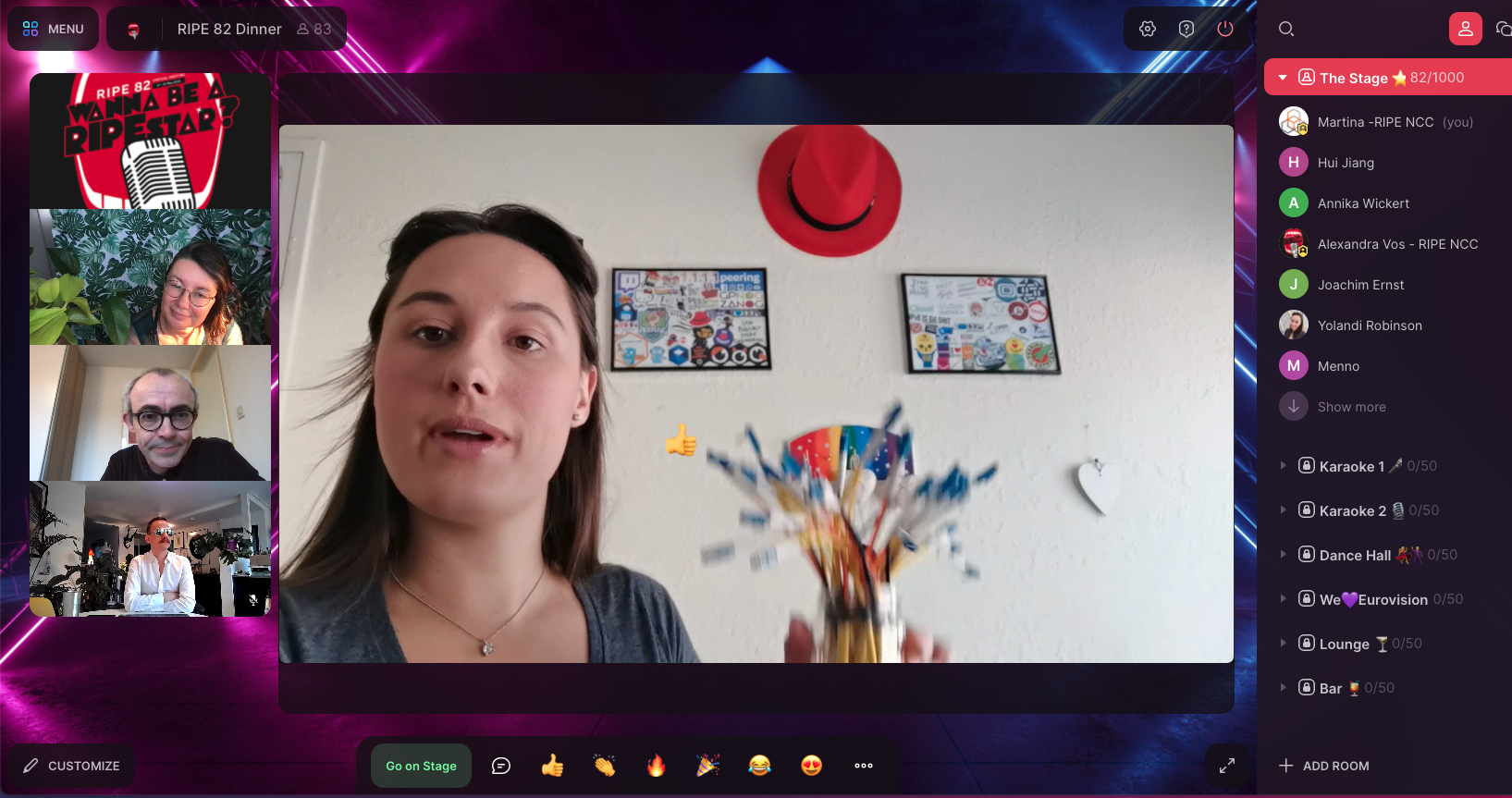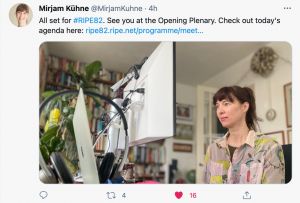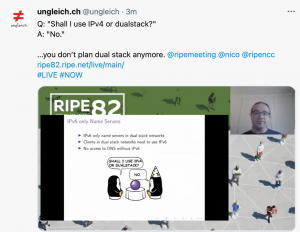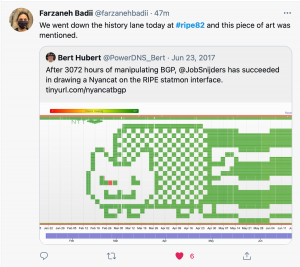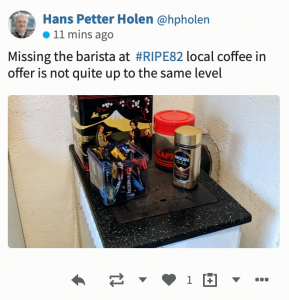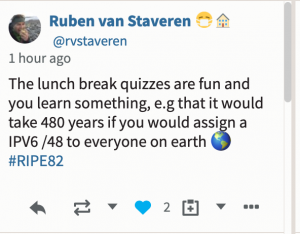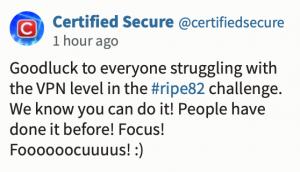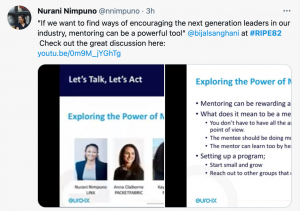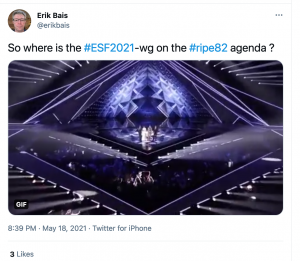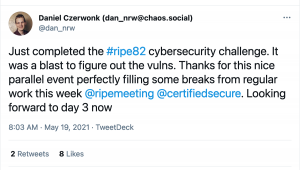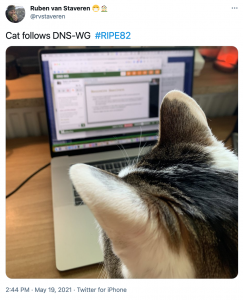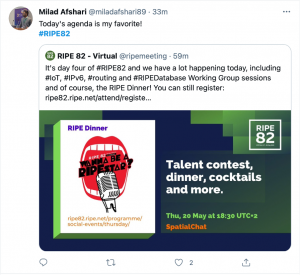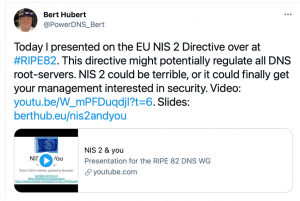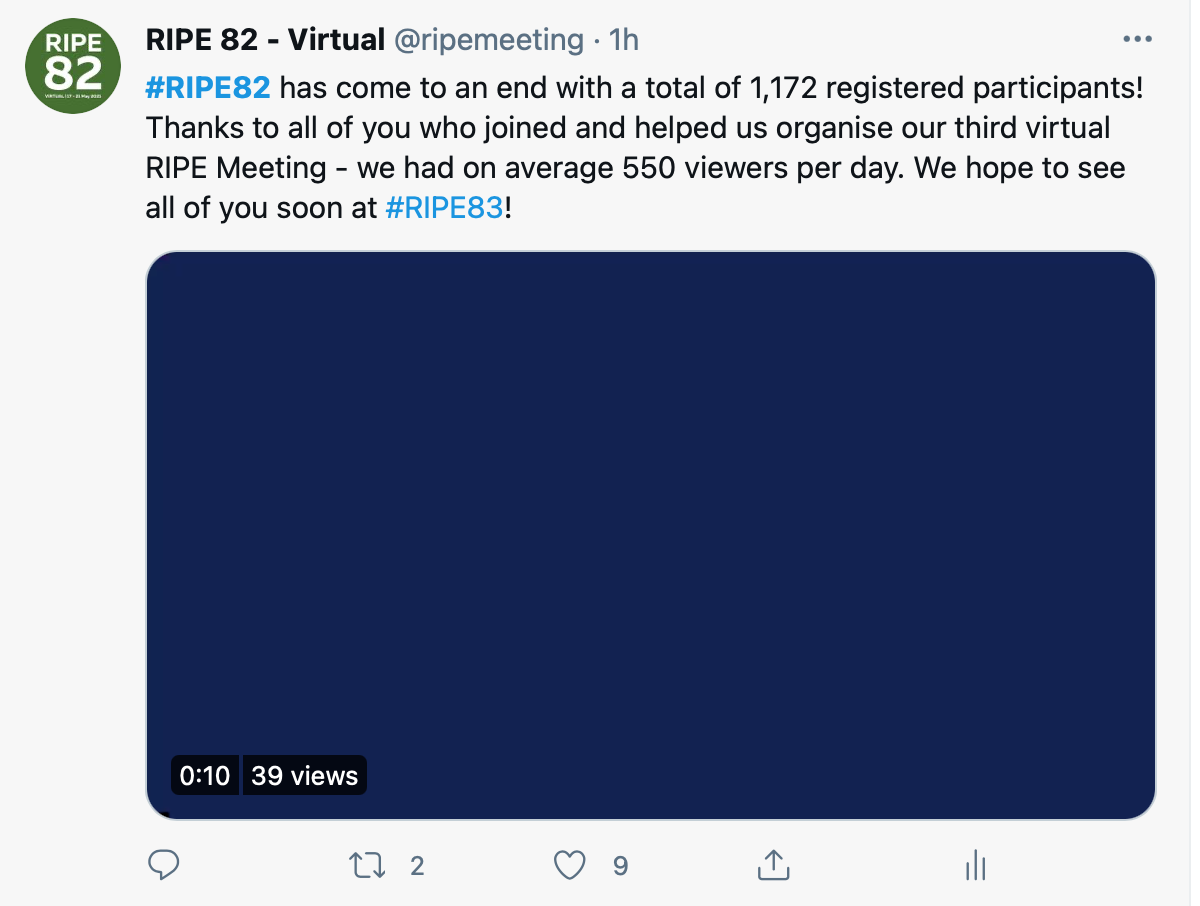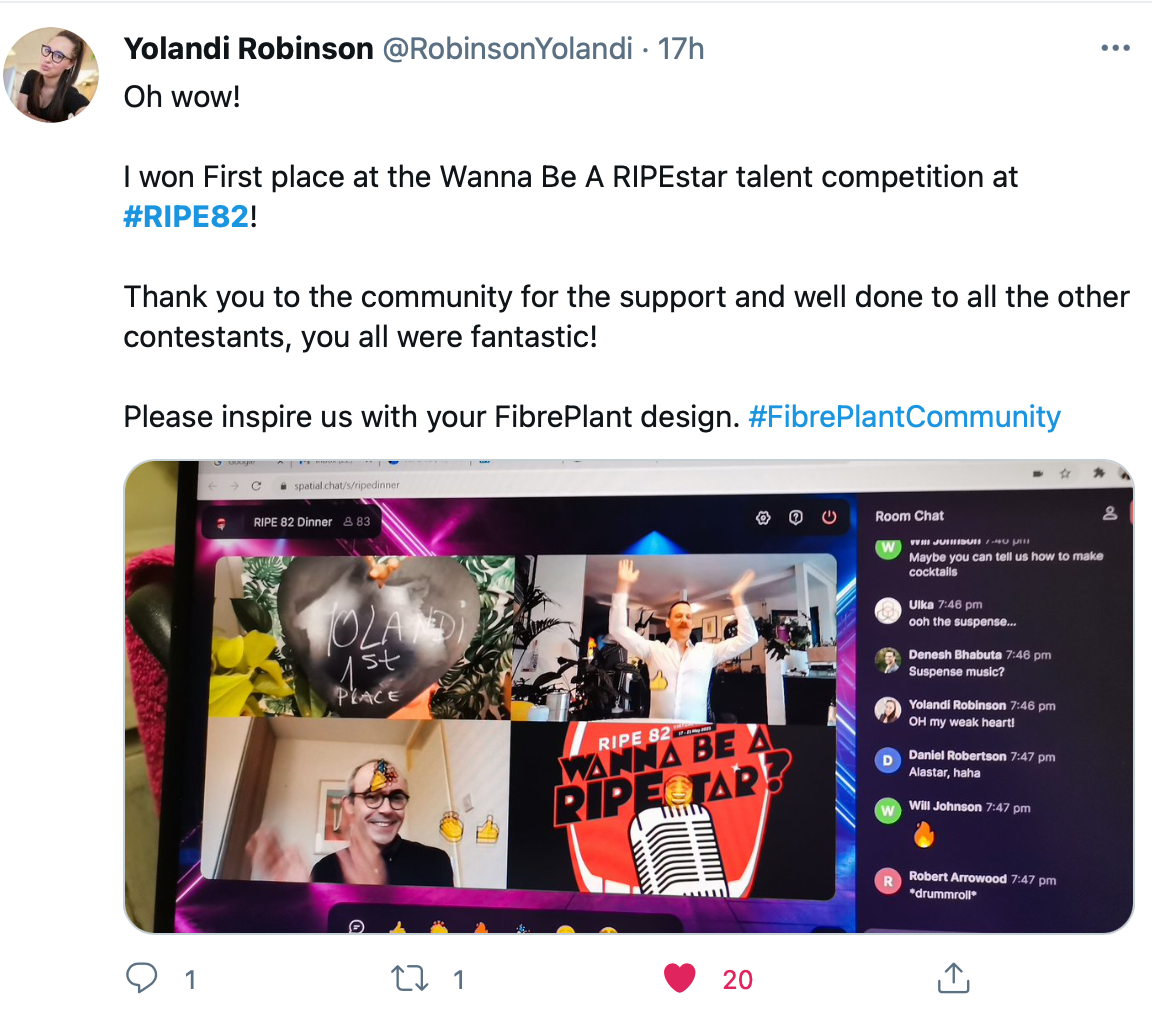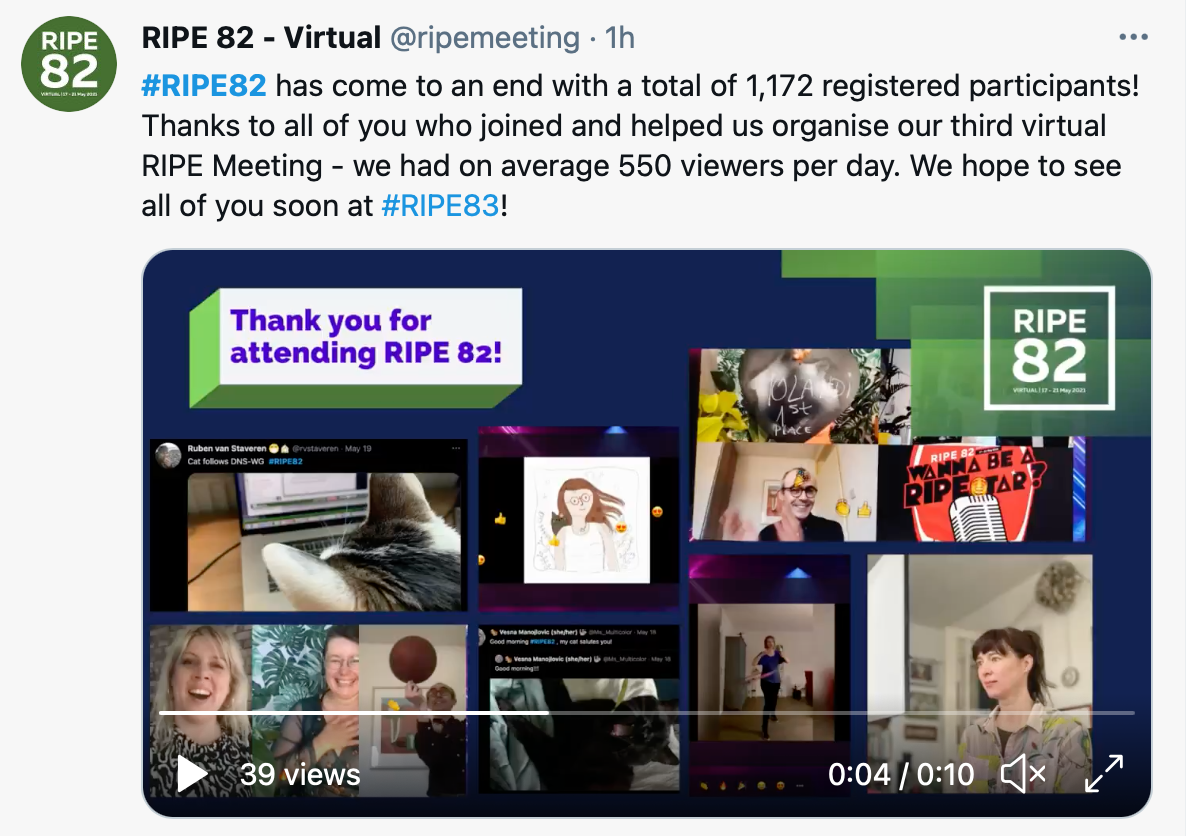Monday, 17 May
The first day of RIPE 82, our third virtual RIPE Meeting, welcomed 1,077 registered participants from 91 countries.
Mirjam Kühne, RIPE Chair, welcomed all participants to the meeting with a few words from Hans Petter Holen, RIPE NCC Managing Director, and Franziska Lichtblau, RIPE Programme Committee Chair.
Christian Adell Querol shared tips on how to handle your circuits proactively using Nautobot.
Erik Bais presented the results from the RIPE community wellbeing survey and shared interesting insights on how to approach mental health challenges.
Frank van Vliet kicked-off the RIPE 82 Cybersecurity Challenge. If you haven’t registered yet, drop meeting [at] ripe [dot] net an email! Frank was followed by Gerardo Viviers, our RIPE Meeting Quizmaster, who hosted a Kahoot! Quiz, sponsored by Team Cymru, and tested our knowledge on Security. Stay tuned for tomorrow’s quiz on ‘Best Practices’.
The afternoon plenary sessions saw presentations from Nico Schottelius, who asked if we’re ready to enter a post-IPv4 world, while Patrik Fältström and Stephen Farrell gave an update on the long-running debate around privacy, encryption and law-enforcement, which continues to this day.
Geoff Huston gave us an overview of DNS, how it has evolved over the years and why it’s still very important. He was followed by Daniel Wagner who gave a lightning talk on the IPFIX protocol and a useful export for IXPs, and Nigel Titley who asked the community for volunteers for the next Rob Blokzijl award.
Following up on the wellbeing talk from earlier this morning, Lenka, RIPE NCC’s management assistant and stretching coach, reminded us to take regular breaks and shared some stretching exercises to help us get re-energised.
The afternoon plenary sessions continued with Alexander Azimov, who delved into Flow Labels and how they can be used to create self-healing networks in data centres. Alexander also asked the community for volunteers to help him standardise this within the IETF.
He was followed by two Lightning Talks, the first with Christian Teuschel who celebrated the 10 year anniversary of RIPEstat by sharing some highlights and showing its evolution over the past decade. Marco Hogewoning then presented an update on NIS, looking at the European Parliament’s proposed amendments, along with the RIPE NCC’s response and next steps.
And finally, we wrapped up the evening with the SCION BoF and the informal ‘Meet the RIPE Chair Team’ and ‘Meet the RIPE NCC Executive Board’ sessions on SpatialChat.
If you missed any sessions – the recordings and presentations are available on the presentation archives!
Our favourite tweets of the day:
Tuesday, 18 May
We welcomed over 1,136 of you to the second day of RIPE 82, the day on which the Address Policy, Connect, Cooperation and Open Source working groups rolled up their sleeves and got down to work, despite a few people being bleary-eyed (no doubt from having attempted to crack the RIPE 82 Cybersecurity Challenge all through the night).
The Address Policy Working Group tried something different by asking participants to watch pre-recorded presentations ahead of time, to allow for a longer discussion time. And they needed every minute of it. One of the main topics of discussion was the chicken-and-egg relationship between address distribution policies and the RIPE NCC’s Charging Scheme for members, something that will crop up again in the General Meeting tomorrow. The extended discussion time is still not enough to delve into this, and the conversation will continue on the mailing list.
Gert Doering stepped down as the co-Chair after 18 years at the helm and was warmly applauded for his long-standing contribution to the Working Group and RIPE community. Co-Chair Erik Bais welcomed on board two new co-Chairs: James Kennedy and Leo Vegoda.
The Open Source Working Group chairs boldly staked claim to the title of ‘your favourite working group session’. If you did indeed miss your favourite working group session, you missed out on Alexander Zubkov’s presentation on his Mixtoolkit, an update from Marcos Sanz Grossón on the IX-API, which is a joint effort between AMS-IX, DE-CIX, and LINX and Frederic Loui’s update on the rare.freertr.net project.
The Connect Working Group on the other hand claimed to take place under the sea (and showed the font to prove it). Simone Morandini shared insights into IXP traffic in Italy, Spain and France during COVID lockdowns, and the fun fact (this will come as no surprise to football fans) that NAMEX saw their traffic which hit their peak during a Juventus-Lazio game. Bijal Sanghani provided an update from Euro-IX and stressed the importance of mentorship. The GAIA-X initiative and abuse were also briefly discussed, with Erik Bais offering to connect discussions in the Anti-Abuse Working Group with the Connect mailing list.
EU legislation that could impact the RIPE community will be discussed across different sessions, and the Cooperation Working Group saw Agne Kaarlep of the European Commission give an overview of the Digital Services Act. In response, Polina Malaja (CENTR) explained the three recommendations CENTR sent to the European Commission on behalf of European ccTLDs, namely to include a clear liability exception for the technical auxiliary function of DNS, to clarify the definition of illegal content and to first try to address issues of content as close to the sources as possible before legislating DNS operators. Rob van Kranenburg also presented the idea of ‘disposable identities’ after disposing of his audio issues.
And finally, the Olaf Kolkman moderated the BoF on the Code of Conduct, with the CoC Task Force eager to hear from the community on how to proceed with its next steps. If you’d like to be involved, please follow the RIPE Discussion (ripe-list) mailing list.
Spotted on chat today (it is being archived and it will be published)
Some RIPE community members were feeling their age … “having routers in your network older than some of your coworkers feels really weird”
Our favourite tweets of the day:
Our favourite slide of the day
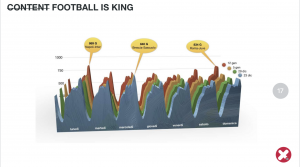
Wednesday, 19 May
Wednesday was the second day of the RIPE Working Group (WG) sessions. Here are some of the highlights from the day:
Anti-Abuse
- Brian Nisbet was re-elected as Co-Chair for another three-year term.
- Graeme Bunton (DNS Abuse Institute) presented their ongoing efforts to protect Internet users from the threat of DNS Abuse such as malware, botnets, phishing, pharming and spam.
- Daniel Kopp (DE-CIX) shared an IXPs perspective on DDoS amplification attacks, the impact that they have on victims and the results of their most recent research into the topic.
MAT
- A demo from Luuk Hendriiks (NLnet Labs) showed how JDR.jl – the library powering the JDR tool – can be used to get into the nitty gritty details of RPKI in human readable form, letting operators and researchers alike get a proper understanding of what’s going on in there.
- Looking back at ten years of RIPEstat, Christian Teuschel walked the audience through the history of RIPEstat and looked at the work that went into launching the brand new and improved UI, released just the day before.
- In a swift tools update from the RIPE NCC, Robert Kisteleki looked into what’s new with RIPE Atlas and other RIPE NCC tools. Part of this was a call for people to take a look at the new offering of research ideas the R&D team has made available for researchers and practitioners from outside the RIPE NCC.
DNS
- Geoff Huston and João Damas (APNIC) presented interesting metrics on DNS centrality, focusing their research on resolvers.
- Anand Buddhdev (RIPE NCC) updated the community on recent RIPE NCC DNS activities including CDS updates, K-root, AuthDNS and DNSSEC.
- Ondřej Caletka (RIPE NCC) talked the audience through the RIPE NCC recent deployment of CDS/CDNSKEY which is providing in-band signalling for changes in the parent delegation. He mentioned that adoption was slowly growing.
- The session ended with a pre-recorded presentation from Bert Hubert (PowerDNS) on root servers and the new European NIS directive.
RIPE NCC Services
- Hans Petter Holen (Managing Director), shared his experience after one year at the helm of the RIPE NCC and gave an update on different topics including the organisation structure, IPv4 runout, on-going work to standardise RIPE NCC platforms, and new learning courses.
- Felipe Victolla Silveira (COO) gave an overview of the current operational challenges facing the organisation. He explained that due to the growth of members holding multiple LIR accounts, the cost of compliance and work complexity is increasing.
- Kaveh Ranjbar (CIO) discussed the RIPE NCC’s cloud strategy, and how this can help to keep our services available, resilient, and secure. The aim is to apply a “cloud first” approach whenever possible when developing new services.
- Razvan Oprea (Senior Systems Engineer) explained how they would make this cloud strategy happen. The Cloud Centre of Excellence was formed last year to enable access to cloud platforms for any team that wants to move services to the cloud. Some services have already moved over, and others will move in the near future.
Our favourite tweets of the day:
Thursday, 20 May
We welcomed over 1,172 attendees on another busy day of RIPE 82 with 507 unique participants on Meetecho. The IPv6, IoT, Routing and Database Working Groups were in the limelight today with lots of discussions, updates and presentations throughout the day.
IPv6
- The IPv6 WG re-elected Jen Linkova as Co-Chair for another three years – congratulations Jen!
- Geoff Huston kicked off the session with a quick update on measurements his team has done on fragmentation loss rates in IPv6.
- He was followed by Tim Chown who talked about the RIPE-554-bis document and asked community members for input before publishing it.
- Yannis Nikolopoulos shared some useful insights into MAP-E residential deployment in Greece and the issues encountered along the way.
- Paolo Volpato came up next to talk about the status of IPv6 deployment. A noteworthy comment from an attendee was that the introduction of IPv6 does not immediately relieve the pressure of the IPv4 address pool, and dual-stack does not help with this problem. Only IPv6-only deployment does help with the IPv4 address shortage!
- Last, but certainly not least, Jens Link talked about ‘Happy Eyeballs’ and why it’s considered harmful at the moment.
IoT
- Said Jawad Saidi (MPI-Informatics) presented on their research collaboration with a large European ISP that looked at whether they could identify IoT devices on a network. Their methodology allowed them to identify 77% of studied IoT devices within the ISP, detecting four million devices in total.
- Natasha D’Souza from the Canadian Internet Registry Authority (CIRA) spoke on the project to use their registry to secure IoT devices. Among other things, she noted that the IoT landscape today was predominantly made up of walled gardens, and greater interoperability would be needed over the long term.
- Finally, Constanze Dietrich (IoT WG Chair) shared the results of the survey that had been sent to the WG. With a sample size of 16 respondents, quantitative analysis wasn’t realistic – but one point that was noted was that it was not clear what the purpose of the WG was. Some thoughts during the Q&A were that the WG should serve as an interface between those actually running networks and the people who were developing IoT devices, and that they should focus on those parts of the IoT landscape that they could affect.
Routing
- Emile Aben (RIPE NCC) updated the community on recent RIS activities, looking at the continued RIS expansion and what the downsides are, how the project can be developed in the future and asked participants to join him in the ‘RIS Jam’ SpatialChat room to talk feedback and use-cases.
- Nathalie Trenaman (RIPE NCC) was up next to talk about the new RIPE NCC RPKI compliance and audit process and how the RIPE NCC network is now running RPKI Route Origin Validation on AS3333. Nathalie went through other developments including cloud deployment, deprecating the RPKI Validator and what is coming soon, Nathalie asked participants to get involved and provide feedback.
- Massimo Candela (NTT) provided his experience on RPKI deployment and talked through how automation and monitoring eased their NTT RPKI operation, including using open-source software real-time monitoring such as BGPalerter.
- The Routing WG ended with a talk on ‘The Phantom Menace’ or Routing Loops by Alexander Zubkov. Alexander presented a study on the problems of loops with simulations and statistics, with a fun slide at the end of traceroutes including Star Wars and Christmas tree loop.
Database
- Edward Shryane (RIPE NCC) shared an update from the RIPE NCC Database Team on their progress since RIPE 81 and upcoming changes.
- Massimo Candela (NTT) presented on Geofeeds in the RIPE Database and proposed solutions on how to fix it.
- Sander Buskens (RIPE NCC) updated the audience on the cloud-related work done in the RIPE Database since RIPE 81 and the next steps. He also shared more details on how the RIPE Database will switch to UTC.
- Denis Walker (DB-WG Chair) walked the audience through the progress made on the open Numbered Work Items (NWI) and suggested cancelling some of them when there’s no discussion for a long time. He asked the community to share feedback on these suggestions via the db-wg mailing list.
The day will end with a Eurovision inspired evening of cocktails, talent contest and karaoke! Join the RIPE Dinner from 18:30 (UTC+2)
Tomorrow, we have the GM results at 10:15 (UTC+2) and continue the Community Plenary at 10:30 (UTC+2) – see you there!
Here are some of our favourite tweets from today:
Friday, 21 May
Wrapping up the meeting week, Friday focused on the RIPE Community itself – here’s a summary:
RIPE Community Plenary
- Mirjam Kühne, RIPE Chair, gave an update on the work of the RIPE Chair Team since RIPE 81. Among other things, she noted that they planned to document some principles around how RIPE NCC staff can participate as a part of RIPE community.
- Shane Kerr presented on the progress of the RIPE Database Task Force, noting that no decision had yet been made on the issue of publishing legal addresses in the RIPE Database. The TF plans to publish its next draft in Q3 2021.
- Leo Vegoda gave an update from the RIPE Code of Conduct Task Force, reporting back from the BoF that was held on Tuesday evening.
- Nurani Nimpuno gave an update from the IANA Review Committee. TL;DR: everything’s fine, and when it comes to this topic – “boring is good!”
Closing Plenary
- In the technical report it was noted that the Meetecho chat had gone down not with a bang, but a giggle { message:”<giggle>”, at: 1621241766582, sender:“Jan Žorž”}
- Brian Nisbet, RIPE PC Vice Chair announced that Milad Afshari and Franziska Lichtblauw had been elected to the RIPE Programme Committee
- In her closing remarks, Mirjam noted that after the BoF on Monday, there was no clear consensus to form a new SCION WG. She encouraged the people involved in this initiative to keep working with the community through the existing channels.
- James Kennedy was elected to the NRO NC.
- This was Gert Döring’s last meeting as co-chair of the Address Policy WG – ending an impressive 18-year stretch. Thank you, Gert!
- RIPE 82 saw 1,172 people registered, 274 newcomers, and an average of 550 viewers per day. The top-five countries represented at this meeting were Germany, Netherlands, United Kingdom, United States and Italy.
- A mysterious group of individuals then seized control of the meeting to promote their new cryptocurrency. If you have any clues or know of their whereabouts, please inform the RIPE NCC. We have been tracking them for some time now.
Yesterday’s RIPE Dinner
To properly mix up the virtual RIPE Dinner format, Thursday evening’s buffet of entertainment began with a cocktail workshop (everyone followed the instructions, right?) before moving to a talent show that was judged by a panel of discerning local celebrities (Alexandra Vos, Fergal Cunningham, Vesna Manojlovic, and Alastair Strachan). The result of their wild and arbitrary scoring was that Yolandi Robinson came away the winner. Imma let you finish, but Fergal should’ve won for his ability to spin a basketball while promoting the NRO NC elections. Of course, he was a judge and this might’ve raised questions about the process. The talent show was followed by the traditional mingling and dancing, albeit mediated across vast distances via SpatialChat.
